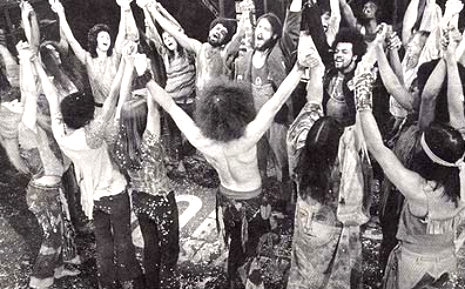
The Memphis production of Hair.
Here’s something special from the Dangerous Minds archives.
A couple of years ago, I went to the Broadway revival of Hair. It was dreadful. The faux good vibes and desperate attempts by the actors to replicate the look and mannerisms of the hippies of the sixties was about as real as the $20 Rolex watches being hawked up the block by Nigerian street vendors. When one of the actors mistook my long hair as an indicator that I’d be receptive to his attempt to dance with me during the audience participation part of the play, he was immediately repelled by my Charlie Manson impersonation. If looks could kill there would have been one dead plastic flower child on Broadway that night. Hair was the Summer Of Love had it taken place in Las Vegas instead of San Francisco. When the cast disrobed in the infamous nude scene, I was struck by how all of the female actors’ pubic hair was neatly manicured, trimmed and waxed. A perfect metaphor for how Broadway had tamed the unruly energy of the hippie movement.
I went to Hair out of curiosity. I’d never been able to sit through the movie in its entirety and when the play made its initial Broadway run in 1968 I, like most hippies at the time, was disgusted by the co-option and commercialization of hippie culture that the play and the movie represented. But, resistance was futile. Our underground movement floated belly-up to the surface of the mainstream where peace signs and smiley faces were being used to sell Polyester bell-bottoms, Pepsi-cola and Richard Nixon (“sock it to me”). Hair took the radical provocations of Julian Beck’s Living Theater and turned them into a groovy night for suburban squares, an opportunity to get close to hippie flesh without fear of catching the crabs or the clap, all set to a bombastic musical score that had about as much to do with psychedelia as Dr. Phil has to do with Dr. Leary.
In a city like New York where there were hotbeds of hippie culture in Greenwich Village and a dozen music venues to see great rock bands, from Cafe Wha to the Cheetah and The Fillmore, Hair seemed redundant. If you wanted to groove on some hippie shit go to St Mark’s Place and hit the rubber room at The Electric Circus, spend a few hours in Washington Square Park or Tompkins Square, watch the freak show from a table at Cafe Figaro on Bleeker Street. No need to go uptown and spend the big bucks on a Broadway play. But, take Hair out Manhattan and ship it down South and maybe, just maybe, you might actually rock some boats and squeeze something good out of the whole damn thing.
When Hair Came To Memphis is a documentary that softened some of my distaste for the play. Actually, my feelings for the play didn’t change. What changed was my feelings for the cultural phenomenon of the play and the life-altering impact that mounting a production of Hair in the Deep South had on the people involved in the production and on audiences willing to open up to the larger meaning and context that the play had taken on. The breaking down of racial barriers in the play is particularly profound considering the rampant racism that was still in the air even in an evolving metropolis like Memphis. Having Black and White kids interacting, hugging and kissing on a stage in Memphis in 1970 was in itself a huge affront to the status quo. Throw in the anti-war and drug elements and you’ve created something genuinely radical.
Performed at The University of Memphis, Hair created a shitload of controversy in the Bible Belt. Craig Leake who produced the documentary describes the atmosphere at the time:
This was still less than two years after the assassination of Dr. Martin Luther King. There was a strong feeling of values in the community, namely Christian, mixed with a racial divide. This along with the sanitation strikes made a stew filled with hard feelings. A lot of people were sensitive to outsiders coming in and trying to change values and the idea of a foreign play, this being from New York, produced in the their midst caused alarm. I remember in my own family my aunt was very concerned about the play being shown here.”
The play was polarizing but it ended up being embraced by a large portion of the Memphis community.
The production itself still holds some U of M records, including the largest number of auditioners (over 400), the largest number of tickets sold in the shortest period of time (8,000 in 24 hours) and the largest amount of gross income obtained from any previous run of a single show ($23,000).”
This documentary did for me what the play failed to do: it got me high.
Parts two and three after the jump…





